A Statewide Vision
The TRVA is among several Voluntary Agreements being forged in Northern and Central California. These agreements seek to enhance sensitive fish species and their habitats and ensure a reliable water supply for urban and rural residents, farms, businesses and industry. These agreements represent a more progressive way of managing watersheds than current regulatory approaches and have widespread support throughout the Sacramento and San Joaquin Valleys and the San Francisco Peninsula.
TRVA Key Elements
The TRVA is designed to respond to seasonal variability and meet the life cycle needs of native fish species while protecting water supplies. The Agreement provides elevated river flows for the environment and improved habitat and predation control to support fish populations.
Expected Benefits of the TRVA
The TRVA is a comprehensive, 15-year management plan based on solid science and responsiveness to nature. It provides multiple ecosystem benefits that will enhance fish populations, while also balancing water supplies across all sectors, including the environment, cities, industries, communities and agriculture.
Science Paves the Way,
Anchored by Good Governance
The TRVA is built on best available science and decades of monitoring, data collection and multiple Tuolumne River-specific scientific studies. Under the TRVA, a new Tuolumne River Partnership will be formed to guide a spill management plan and habitat improvement program and to develop a capital fund and annual funding. The Agreement also provides flexibility and the ability to adapt quickly to changing conditions.
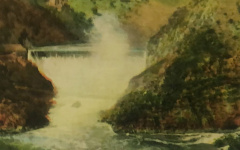
December 31, 2012
Draft Substitute Environmental Document (SED) in support of Phase 1 of the Bay-Delta Water Quality Control Plan released by State Water Resources Control Board for public comment.
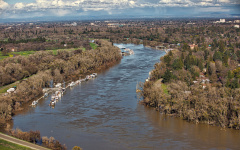
March 2013
State Water Resources Control Board hosts Public Hearings on 2012 Draft SED (Sacramento).
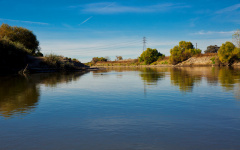
September 2016
The State Water Resources Control Board releases its Revised Draft SED for public comment.
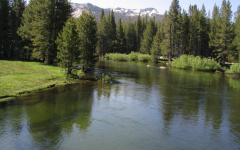
July 6, 2018
State Water Resources Control Board releases Final SED in support of Phase 1 of its Bay-Delta Water Quality Control Plan for public comment.
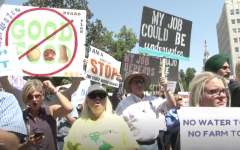
August 20, 2018
More than 1,000 people – including elected officials and farmers – gather at the state capitol to rally to protest the State Water Resources Control Board’s proposed plan.
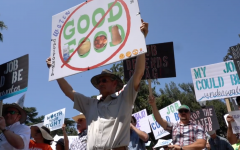
August 21-22, 2018
State Water Resources Control Board holds a public meeting to receive oral comments on the proposed plan. Testimony was heard from more than 150 individuals and groups.
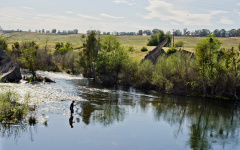
August 22, 2018
State Water Resources Control Board announces it will continue the meeting and defer final action until Nov. 7.
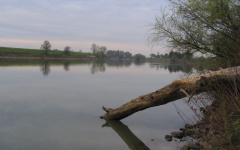
November 6, 2018
Gov. Brown and Lt. Gov. Gavin Newsom send a letter to the State Water Resources Control Board requesting action on the plan be postponed until Dec. 11, 2018, to allow voluntary agreement negotiations to progress.
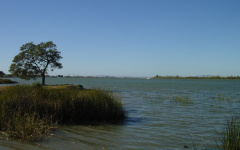
November 7, 2018
The State Water Resources Control Board votes to postpone further consideration of the proposed plan until Dec. 11-12 to allow voluntary agreement talks to happen.
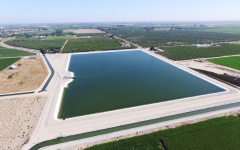
December 12, 2018
State Water Resources Control Board adopts the Final Substitute Environmental Document that increases water flows along the Tuolumne River. Staff will further evaluate a voluntary agreement between TID and 13 other agencies to manage both the San Joaquin and Sacramento River systems and provide an analysis by March 1, 2019.
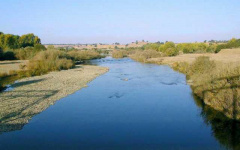
January 10, 2019
The San Joaquin Tributaries Authority, of which TID is a member, files a lawsuit challenging the Phase 1 of the State Water Board’s Bay Delta Plan.
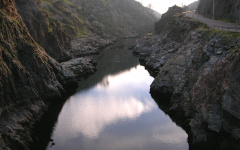
March 1, 2019
Keeping the potential for voluntary settlements alive, TID and a diverse coalition than 40 agencies submit a Project Description to the State Water Board for further analysis as part of its Bay-Delta Plan environmental review.
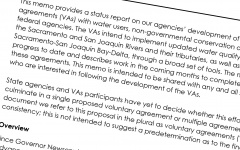
July 1, 2019
The State of California issues its Voluntary Agreements Progress Report, outlining progress to date and describing the work needed to complete and evaluate any agreements. Read more
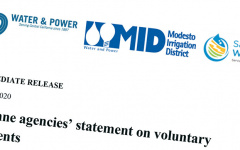
February 2020
Responding to a Governor Newsom editorial, TID, MID and SFPUC issue a joint statement thanking the Governor for his leadership and reiterating Tuolumne River agencies' commitment to the VA process. Read more
“Grounded in solid science, the Tuolumne River Voluntary Agreement is a revolutionary approach to managing and balancing water supplies to support thriving communities and fisheries.”
– The TRVA Partners: Tuolumne Irrigation District, Modesto Irrigation District and San Francisco Public Utilities Commission.
If you would like more information about the Turlock Irrigation District, please contact us using the form below.
